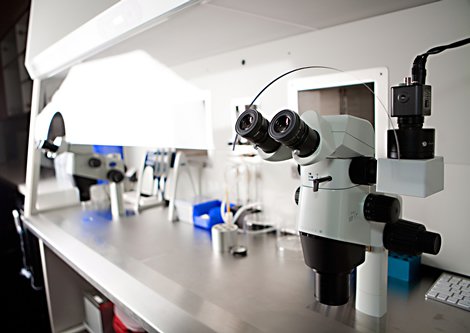

[vc_row][vc_column][vc_column_text]At IVI we take steps to ensure the best possible outcome for each of our patients, by exploring the options that are most suitable for each case and by providing individualised care. One of the ways in which we improve the chances of success for some of our patients is by offering pre-implantation genetic diagnosis (PGD). This procedure helps us to optimise IVF experiences, boosting the probability of conception with a healthy embryo. It means that genetic material including sperm and eggs (oocytes) are screened prior to use to ensure that any chromosomal abnormalities are identified before the treatment goes any further. This can be a very useful approach, especially in older patients whose offspring may be exposed to an increased risk of genetic disorders such as Down’s, Edwards’ and Patau’s syndromes. PGD is also recommended for those who have suffered multiple miscarriages or who have already been through one or more failed IVF cycles. The procedure harnesses scientific expertise to stack the odds firmly in favour of the patient.
For whom is PGD suitable?
IVI’s medical experts will assess whether PGD is the right choice for the patient(s). If so, the procedure will be offered in addition to IVF. Some patients suffering from infertility causes such as repeat miscarriage or age-related issues may especially be helped by undergoing PGD. However, any patient undergoing IVF with IVI can ask to be assessed for suitability. We are world leaders in the technique, as the first clinic in the world to have successfully screened for and intercepted a specific chromosomal abnormality through PGD in 2006. A healthy baby was subsequently born to a couple with a high risk of lymphohistiocytosis affecting their offspring. Since then we have continued to research and develop the procedure, to such an extent that we are now able to examine all 23 chromosome pairs, whereas just a few years ago it was only possible to examine nine.
PGD is particularly recommended for: female patients over the age of 40 who intend to use their own eggs instead of donor eggs; and couples whose offspring are exposed to an increased risk of chromosomal abnormalities. Apart from the better-known Down’s and associated syndromes, these can include: cystic fibrosis; osteoporosis; Huntington’s disease and haemophilia A. When the patient(s) attend their initial appointments at the clinic they will be asked questions about their genetic histories, including that of their families. The answers may serve as an indicator as to whether the patient or couple is at risk from one of these or other chromosomal abnormalities. IVI offers pre-implantation genetic diagnosis (PGD) and pre-implantation genetic screening (PGS) as part of our range of advanced assisted reproduction treatments. We also offer oocyte vitrification, fertility preservation, sperm and egg donation and various other treatments at our 30 fertility clinics in Spain.
What does the PGD procedure entail?
In the preliminary phase, on patients who are potential carriers of an abnormality, genetic characterisation tests are carried out. This lets the medical experts acquire as much information as possible before ordering the PGD. The next step is to create “pre-embryos” through assisted reproduction. Even if the patient or patients are able to conceive naturally, this vital step must be taken. On the third day after fertilisation the pre-embryo consists of between six and eight cells, and at this point a biopsy is carried out. One or two cells are removed for examination, without hindering the development of the pre-embryo. The chromosomes are examined while the pre-embryo goes back into an incubator to continue developing. Once the results come through, the centre discusses them with the patient(s) to determine which of the embryos should be transferred into the uterus. PGD is no more painful than IVF as the biopsy and diagnosis are done on the pre-embryo while it is outside of the female body.
PGS and PGD raise the chances of pregnancy to 70%. They also raise the likelihood of conception on the first cycle of IVF, speeding up the whole process for potential parents. The treatment is done quickly and efficiently, and does not interfere with the total time taken to undergo IVF. Additionally, only the best quality embryos are transferred, significantly reducing the risk of miscarriage.
IVF Plus
IVI clinics offer what we call IVF Plus, a combination of IVF and pre-implantation genetic screening (PGS). While PGD looks for specific genetic abnormalities, PGS is a more general screening process designed to catch any and all abnormalities by checking for the correct number and make-up of chromosome pairs. This is particularly useful and recommended for patients who have suffered multiple miscarriages, as it may identify their cause(s), thereby significantly increasing the likelihood of conception occurring subsequently using screened genetic material. PGS is also particularly suitable in case of endometriosis, diminished egg supplies or male factor infertility. It gives the patient(s) the best possible chance of using high-quality genetic material.
In cases where the eggs or sperm have come from a donor, PGS or PGD may still be a useful option to consider. While all donors will have been thoroughly examined and tested, PGS eliminates the possibility of chromosomal abnormalities that may occur as a consequence of the patient and the donor both being carriers of the same genetic abnormality.
PGD and PGS, along with other assisted reproduction treatments, may offer the best possible chance of achieving conception and delivering a healthy baby free from any genetic abnormalities.[/vc_column_text][/vc_column][/vc_row][vc_row][vc_column]
[/vc_column][/vc_row]



Comments are closed here.